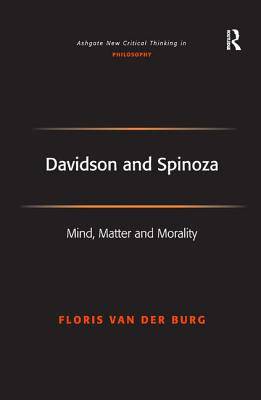
- Afhalen na 1 uur in een winkel met voorraad
- Gratis thuislevering in België vanaf € 30
- Ruim aanbod met 7 miljoen producten
- Afhalen na 1 uur in een winkel met voorraad
- Gratis thuislevering in België vanaf € 30
- Ruim aanbod met 7 miljoen producten
Zoeken
Omschrijving
Baruch Spinoza a Dutch rationalist philosopher of the 17th century and Donald Davidson one of the most distinguished contemporary American analytic philosophers, are two thinkers not usually analysed in conjunction with each other in the philosophical literature yet there are remarkable parallels in their thought. In this book Floris van der Burg identifies topics of comparison in the areas of ontology, epistemology, philosophy of mind and philosophy of language and, after explaining the theory of each philosopher, examines the parallel themes between Spinoza and Davidsonian theory.
Specificaties
Betrokkenen
- Auteur(s):
- Uitgeverij:
Inhoud
- Aantal bladzijden:
- 116
- Taal:
- Engels
- Reeks:
Eigenschappen
- Productcode (EAN):
- 9780754639749
- Verschijningsdatum:
- 28/05/2007
- Uitvoering:
- Hardcover
- Formaat:
- Genaaid
- Afmetingen:
- 156 mm x 234 mm
- Gewicht:
- 344 g

Alleen bij Standaard Boekhandel
+ 610 punten op je klantenkaart van Standaard Boekhandel
Beoordelingen
We publiceren alleen reviews die voldoen aan de voorwaarden voor reviews. Bekijk onze voorwaarden voor reviews.








